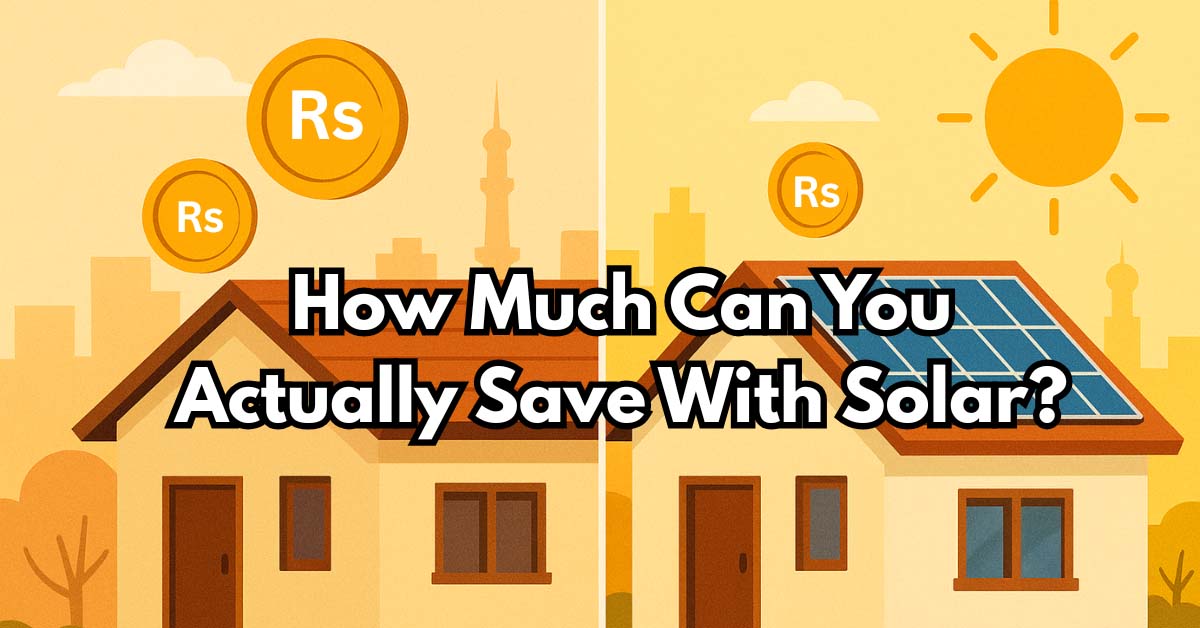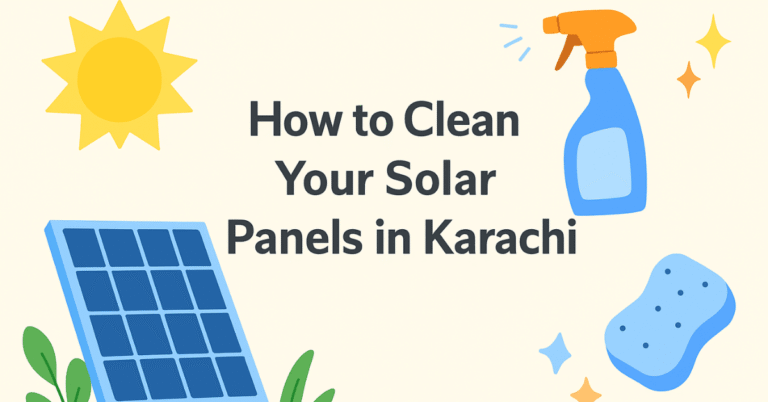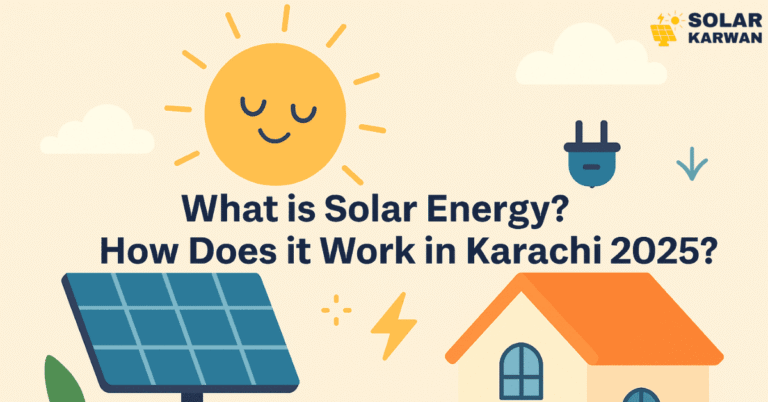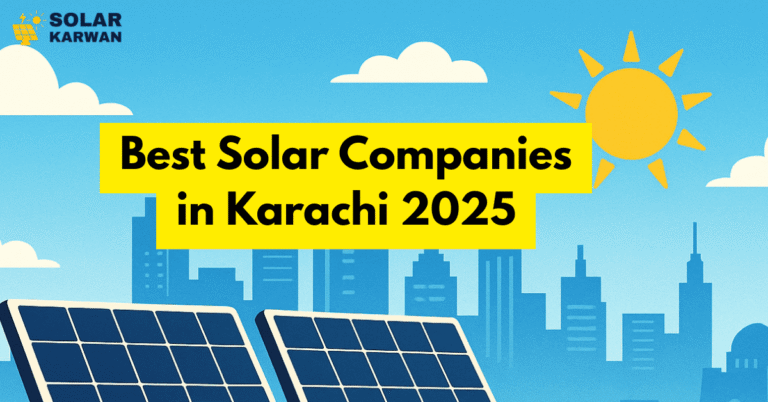Save money every month without altering your lifestyle. That’s the promise of solar energy for households in Karachi.
With rising electricity rates and increasing difficulty in managing monthly bills, many people are beginning to ask the important question: How much can you actually save with solar energy?
This blog provides a clear and realistic breakdown of the numbers. From what you’re already spending on electricity to how much a solar setup costs and how quickly it starts paying off!
We’ll walk you through it all: no vague claims, just real savings based on real Karachi homes.
The Reality of Your Current Bill in Karachi

Before we talk about how much you can save with solar, let’s look at what you’re already spending.
Many households in Karachi do not closely monitor their electricity usage, and they simply pay the monthly bill that arrives.
However, these monthly bills gradually add up to a surprisingly significant total each year.
Electricity rates have been rising steadily, and even small homes are now receiving bills that would’ve seemed unthinkable a few years ago. Add fuel charges, taxes, and quarterly adjustments, and you’re often paying more than you consumed.
As of mid-2025, residents of Karachi pay an average of Rs 38 for each unit of electricity used in their homes.
This price is after the latest changes were made. To find out how much your home will cost, multiply the number of units you use in a month by this rate.
Monthly & Yearly Electricity Costs
Let’s break down what different usage levels look like in terms of real money:
| Monthly Usage | Estimated Monthly Bill (Rs) | Yearly Cost (Rs) |
|---|---|---|
| 300 Units | Rs 11,424 | Rs 137,088 |
| 500 Units | Rs 19,040 | Rs 228,480 |
| 1000 Units | Rs 38,080 | Rs 456,960 |
Even if your usage is on the lower side, you could still be paying over Rs 1.3 lakh per year on electricity alone.
And if you’re in the 500–1000 unit range (like most mid-size to large homes), that number nearly doubles or triples.
These numbers matter because they give you a baseline. Once you see how much you’re already spending, it becomes easier to understand what you stand to save by switching to solar.
➡️ Read: 10 Common Solar Myths in Karachi – Busted!
What Solar Actually Costs in Karachi

Now that you know how much you’re paying in bills, let’s talk about what solar costs.
Installing a solar system is a one-time investment. After that, you start saving every month. No fuel charges. No surprise bills. Just free energy from the sun.
In Karachi, electricity prices vary based on system size. A larger system generates more electricity, leading to greater savings.
➡️Read: Best Solar Panel Brands in Karachi (2025)
Average Prices of Solar Systems in 2025
Here’s a simple breakdown of solar system sizes and what they cost:
NOTE: These prices are based on market rates in Karachi and are only estimates. Actual costs may vary depending on the solar brand, installation quality, and the type of system you choose (on-grid, off-grid, or hybrid). Most of these estimates include the solar panels, inverter, basic installation, and wiring. Batteries are not always included as they’re usually added in hybrid or off-grid systems and can increase the total cost.
| System Size | Estimated Cost (Rs) | Best For |
|---|---|---|
| 3kW | 500,000 – 600,000 | Small homes (300–400 units) |
| 5kW | 750,000 – 950,000 | Medium homes (500–700 units) |
| 10kW | 1.4M – 1.7M | Large homes (800+ units) |
Initially, these costs may appear significant. However, keep in mind that you are already spending Rs 1.3 to 4.5 lakhs annually on electricity.
Investing in a solar system can help you save that money year after year. Most people recover their investment within just a few years, and after that, the system continues to save you money for an additional 15 to 25 years!
How Much Can You Save with Solar?

Let’s get to the part everyone wants to know: How much money will solar actually save you?
Once your system is installed, your electricity bill drops fast. Most homes with solar pay only a small service fee to KE. The rest? Free energy from the sun.
➡️Read: Home Solar Setup Karachi: Easy Step-by-Step Guide
Below is a table that shows realistic savings based on average solar system sizes and household usage:
| System Size | Monthly Bill Before Solar | Monthly Bill After Solar | Monthly Savings | Yearly Savings |
|---|---|---|---|---|
| 3kW | Rs. 11,500 | Rs. 700 | Rs. 10,800 | Rs. 129,600 |
| 5kW | Rs. 19,000 | Rs. 1,000 | Rs. 18,000 | Rs. 216,000 |
| 10kW | Rs. 38,000 | Rs. 2,000 | Rs. 36,000 | Rs. 432,000 |
NOTE: These figures are approximate averages for household energy usage in Karachi. Actual savings may vary slightly due to factors such as sunlight availability, appliance usage, and the system’s quality.
Some people even reduce their bills by up to 90% with solar. And if you install a system with net metering (which we’ll explain soon), you can sell extra electricity back to KE and save even more.
QUICK TIPS FOR BEST SAVINGS:
- Use your appliances during the day when solar power is active
- Keep your system clean (dust can block sunlight)
- Install with trusted solar companies like Sky Electric, Max Energy, and Solar Karwan.
Payback Period

Installing solar is not a small decision. You spend a large amount in the beginning.
So naturally, you want to know when that money comes back to you.
➡️Read: 5 Signs You’re Ready to Install a Solar System at Home in Karachi
The payback period tells you how long it takes to recover your solar investment. After that, all the money you save on electricity is your profit.
How Long Until You Break Even?
Here’s how long it usually takes to earn back your solar investment in Karachi:
| System Size | Total Cost (Rs) | Yearly Savings (Rs) | Payback Period |
|---|---|---|---|
| 3kW | 550,000 | 129,600 | 4.2 years |
| 5kW | 850,000 | 216,000 | 4 years |
| 10kW | 1,600,000 | 432,000 | 3.7 years |
The math is simple. Divide the cost of your system by how much you save every year.
For example, if your 5kW system saves you Rs. 216,000 per year and costs you Rs. 850,000, you’ll recover the full amount in about 4 years.
After that? You keep saving money for 10 to 20+ more years.
Bonus Savings Through Net Metering

Want to save even more? Or maybe earn something back from KE? That’s where net metering comes in.
With net metering, your solar system sends extra electricity back to the grid. In return, KE gives you credits.
These credits are used to lower your future bills or cancel them out completely.
How does it work?
During the day, your system might generate more electricity than your home needs. That extra energy flows into the KE grid, and it’s not wasted.
Instead, it’s tracked by a special bi-directional meter.
At night, when your system isn’t producing, you pull electricity back from KE. But you’re not paying full price because the credits from your extra energy cover that cost.
➡️Read: Karachi Solar Guide: Prices, Setup, Types & Net Metering Explained
Real Example: Let’s say your 5kW system produces 700 units in a month. Your home only uses 500. The extra 200 units go back to KE. Next month, KE gives you credit for those 200 units.
That means your next bill will be lower even if you didn’t generate as much the next month.
Tip: To use net metering, your installer must apply to NEPRA and KE. The process takes 1–2 months, but it’s worth it.
Final Thoughts – Ready to Start Saving?

Solar is not just a trend. It’s one of the smartest ways to save money, especially in a city like Karachi, where electricity prices keep rising.
If you’re paying thousands every month in bills, that money could go toward something better.
With solar, you take control of your energy costs. You spend once and save for 20+ years.
➡️Read: Is Solar Worth It for Apartments in Karachi?
🌞 Your Next Step
Still unsure about solar or confused about where to begin?
➡️Read: Karachi Solar Guide: Prices, Setup, Types & Net Metering Explained
We can help. At Solar Karwan, we offer free solar savings estimates and walk you through every step of the process!
Frequently Asked Questions (FAQ)

Q) Will solar work on cloudy or rainy days in Karachi?
Ans) Yes, solar panels still work on cloudy days. They produce less electricity, but your system will still generate power. You’ll save just a little less on those days.
Q)Do I need batteries to install solar?
Ans) Not always. If you install an on-grid system, you don’t need batteries. You use electricity from KE when needed. But if you want backup during load-shedding, you can choose a hybrid system with batteries.
Q) What if my electricity usage increases later?
Ans) You can upgrade your solar system anytime. Many homes start with 3kW or 5kW and add more panels later as their needs grow.
Q) Is net metering allowed for all homes?
Ans) Yes, most homes in Karachi can apply for net metering. But your system needs to follow the technical rules set by NEPRA and KE.
The good news? Solar Karwan has already helped many clients get approved. We’ve submitted applications with NEPRA and KE and know the full process inside out. With us, you don’t have to worry!
Q) How long does installation take?
Once everything is approved, installation usually takes 3 to 5 days. The full process (including paperwork and net metering) takes 4 to 8 weeks.





